DRS: A RETAILER’S GUIDE

SCOTLAND’S DRS WILL BE AMONG WORLD’S TOP-PERFORMING SCHEMES WITHIN THREE YEARS
+
BUSTING DRS MYTHS +
EUROPE’S MOST SUCCESSFUL DRS
AN SLR SUPPLEMENT
P8 DRS explainer
Everything you need to know about what DRS is and how it will affect the industry.
P10 Sustainability


DRS promises to put Scotland ahead in the sustainability race. Here’s how.
P12 DRS around the globe
A brief history of DRS around the world and through the decades.
P14 Breaking new ground
Working with Tomra, Aberdeen Royal Infirmary became the first hospital in Scotland to host a DRS machine.
P16 DRS myth-buster
Circularity Scotland debunks common misconceptions about how the scheme will work.
P18 Product repackaging showcase
Real-world examples of how brands repackage to improve sustainability credentials.
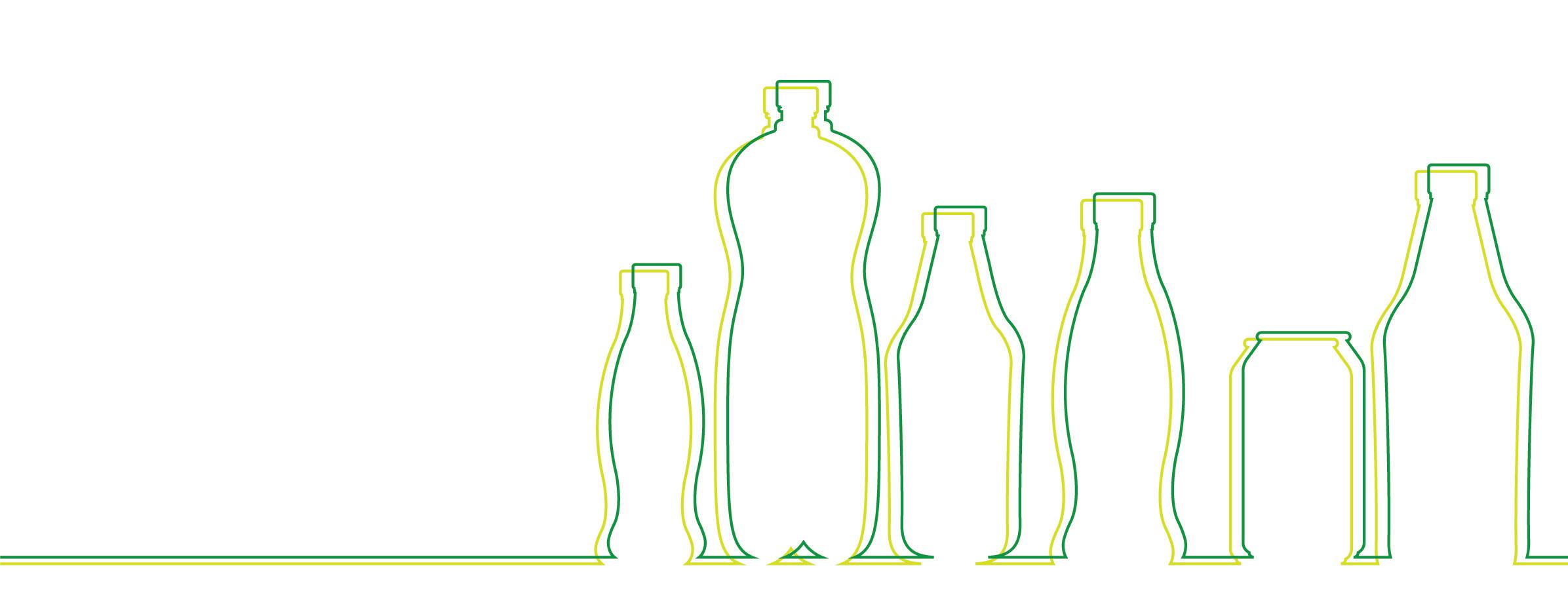
P20 DRS consumer ad campaigns
Communication is key when it comes to educating shoppers about the upcoming scheme.
P23 Growing for good
Sunday Beverage & Food GB&I is committed to driving positive change for local retailers in Scotland.
P24 RVM Systems
RVM Systems offers a wide range reverse vending machines along with flexible payment models.
P26 Envipco
Envipco has long been at the forefront of Deposit Return Schemes across the globe.
2 CONTENTS
The countdown has started...
Scotland’s deposit return scheme (DRS) starts on 16th August 2023.


That’s when retailers will do their bit for recycling and reducing litter by collecting cans and bottles from consumers and paying out deposits. And now retailers will receive 3.7p for the first 8,000 containers collected per week using a reverse vending machine (RVM).

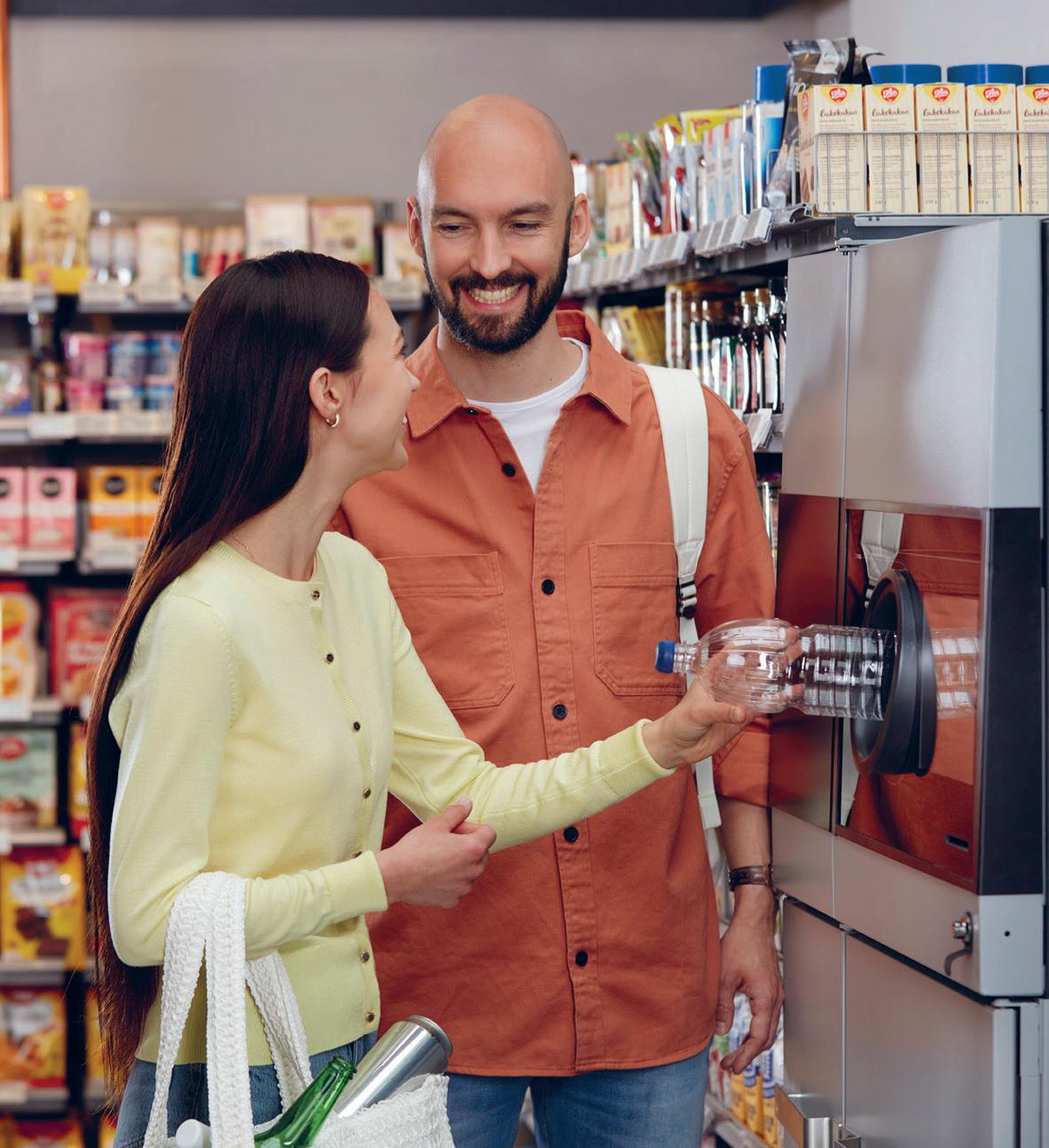
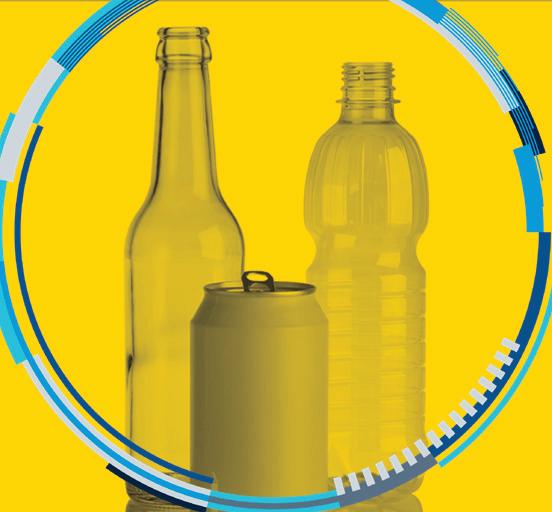
TOMRA already provides 7 out of 10 of the RVMs used across the world today. As well as offering a range of machines for different environments and spaces, we provide digital cloud-based tools and service technicians to keep everything running smoothly.


• 270 bottles
• 550 cans
• 80 glass bottles
Less than 2m2
• 3000 cans*
• 1500 bottles*
TOMRA M1
Only 0.6 m2
Stores up to
TOMRA T70 Dual
up to
Stores
*Compacted. Approximate figures for 1/1 Euro pallet with shakedown. Capacities will vary with object mix, type, and system configuration. Scan now to get a free consultation with an expert
more at tomra.com
Learn
DRS: a retailer’s guide
A warm welcome to SLR’s DRS Guide for Scotland’s local retailers. Straight off the bat, it’s important to note that this supplement has been created purely as a practical guide for retailers as they begin the task of trying to get themselves ready for DRS in time for the go-live date of 16th August.

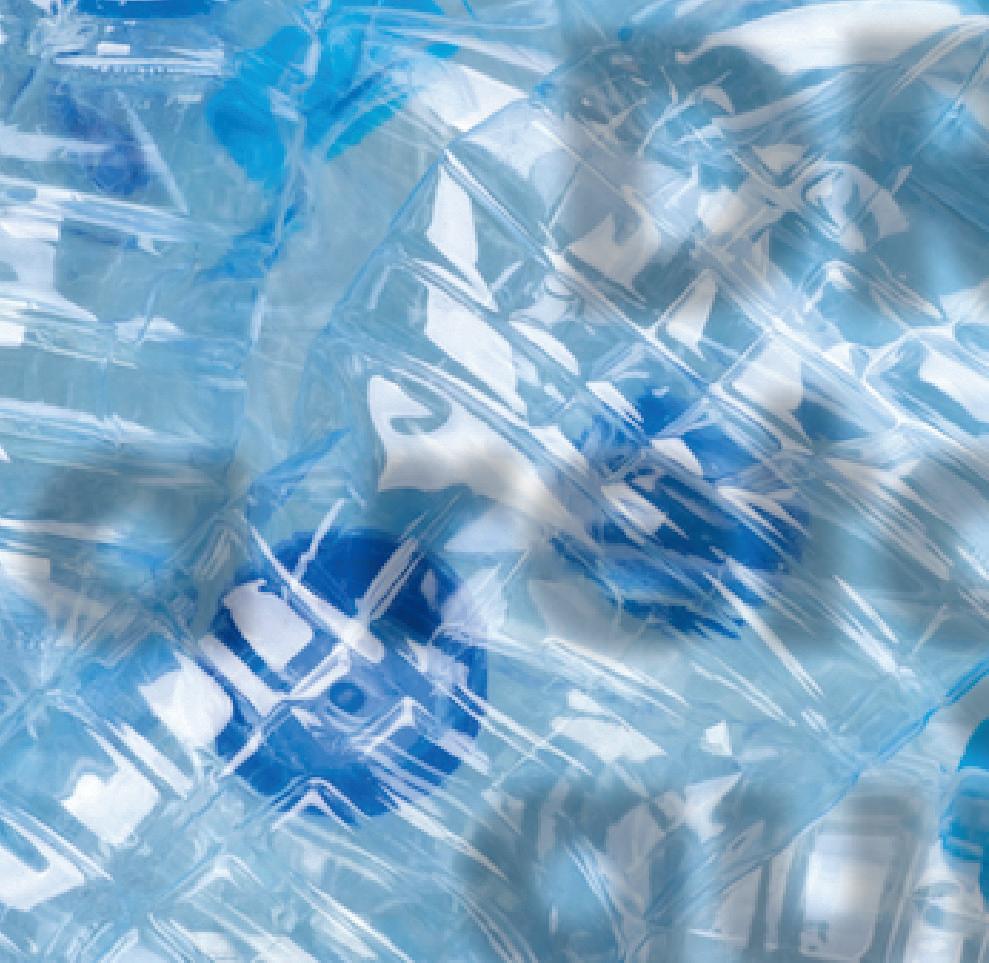
So inside you won’t find any discussion of the perceived rights or wrongs of DRS models in general, or of this Scottish DRS model in particular. This supplement is purposefully not provided as a platform for airing the many opinions that have already been aired on countless occasions on the plethora issues that still vex every link in the supply chain.
No, instead we have attempted to restrict ourselves to the known facts, the unavoidable realities. Unfortunately, as we all know, those remain very thin on the ground.

We had perhaps naïvely assumed that with just six months to go until D-Day, this guide would be focusing more on the positive aspects of DRS: how it will help enhance Scotland’s global reputation as a progressive nation; how retailers should embrace DRS and use it as a launching pad for establishing themselves as the sustainability champions in the many communities they serve across Scotland; and how retailers can leverage DRS to grow footfall, sales and profits using advice from other countries.
Sadly, we haven’t quite reached that stage yet. In fact, we’re nowhere near that stage and, if anything, the next few days and weeks look set to thicken the mud rather than help it settle.
4 WELCOME
If your business makes or imports drinks for the Scottish market, there are producer obligations that you will need to comply with. This includes registering for the scheme by 1 March 2023.
Is your business ready? Find out what your business needs to do at netregs.org.uk/DRS
Scotland’s Deposit Return Scheme
As I write this very article, Lanarkshire retailer Abdul Majid’s legal challenge on handling fees has just gotten underway in the Court of Session. A few days ago Humza Yousaf was sworn in as Scotland’s new First Minister, having already committed in his leadership campaign to amending or even postponing DRS.
So, at SLR, we find ourselves in the uncomfortable position of having to accept that, between the time that this supplement goes to press and the time in lands on your doorstep, much of the content may already be outdated or redundant. The new First Minister undoubtedly has some important issues to deal with in the early days of his new role, but DRS won’t be too far from the upper end of his agenda.
We’re also waiting on some clarity around the much-discussed issue of whether or not the UK Government will grant Scotland an exemption from the Internal Markets Act. Secretary of State for Scotland Alister Jack has told the press that the UK Government will not grant the exemption which effectively means that the DRS regulations could not be enforced for single-use packaged drinks from elsewhere in the UK. In other words, the 20p deposit could only be applied to products bottled in Scotland.
This would clearly put Scottish producers at a competitive disadvantage but it would also result in mass confusion in stores across Scotland. How many angry scenes will take place as retailers try to explain to consumers why they can get their deposit back on some of their containers, but not others?
And these are just some of the unresolved ‘big picture’ issues. There’s also a whole raft of unresolved smaller practical issues like how often Biffa will collect from stores.
The unpalatable truth is that, with only months to go, there are still more questions than answers – which makes our task of attempting to provide retailers with a comprehensive guide to DRS all but impossible. Just like retailers themselves however, we have no choice but to carry on and do it anyway.
As it stands, the official position remains that we will go live on the 16th of August, as reiterated ad nauseam by Lorna Slater, Minister for Green Skills, Circular Economy and Biodiversity of Scotland.
In that case, the entire supply chain has to proceed on that assumption and get ready as best it can –despite very few believing that DRS will go ahead as planned. It may go ahead as planned, purely in terms of the date of implementation, but even if it does, it’s unlikely it will go head in a form that bears much resemblance to the original plan, the original legislation.
So. Just like all of you, we at SLR are doing what we can to help you prepare. We wish you the very best of luck and through the pages of SLR, we will continue to keep you up to date with developments as they unfold.
ANTONY BEGLEY PUBLISHING DIRECTOR, SLR
6 WELCOME
DRS: how does it work?
SLR GOES BACK TO BASICS WITH AN OVERVIEW OF WHAT A DEPOSIT RETURN SCHEME IS, HOW IT WORKS AND HOW IT AFFECTS RETAILERS AND CONSUMERS.
A Deposit Return Scheme (DRS) involves consumers paying a small amount of money (the deposit) for the container when they buy a drink to take away. This is refunded in full when they return the empty container.
The concept of a deposit return system for drinks containers is nothing new, but modern national deposit return schemes require everyone producing and selling drinks in single-use containers to take part.
Schemes like this are already operating successfully in many countries across Europe and in several US and Australian states.
WHAT’S INCLUDED
Scotland’s DRS will include all single-use drinks containers made of:
PET plastic metal glass
All containers between 50ml and three litres will be included and the scheme will cover both alcoholic and soft drinks. The scheme will not include HDPE plastic containers – the kind used for milk and some other drinks – or lined cardboard containers like Tetrapak.
HOW DOES THE FINANCE WORK?
Every item included in the container return scheme will carry a deposit of 20p which will be refunded to the consumer when they take it back to any return point.
The 20p deposit will remain in circulation all the time, passing from the person receiving the container to the person accepting it:
STEP 1 The producer or importer pays a 20p deposit for each drinks container they put into the Scottish market. This is paid to the scheme administrator and they inform Circularity Scotland (CSL) how many containers they sell so that producer fees can be allocated accordingly.
STEP 2 If the product is passing through a wholesaler, they will pay the producer or importer a 20p deposit which they
will recoup when they sell on to the next business in the supply chain.
STEP 3 The retailer will then pay their drinks supplier 20p per container which they will get back from the customer at the point of purchase.
STEP 4 The retailer receives their 20p back from the customer when they pay the container or bottle deposit at the point they purchase their drink.
STEP 5 The consumer gets their 20p back when they take the empty container back to a return point.
STEP 6 The scheme administrator uses the 20p they originally received from the producer or importer to refund the return point operator.
OPERATING AS A RETURN POINT
All retailers and hospitality businesses that sell drinks to take away are legally required to operate a return point, unless they have secured an exemption. This includes online retailers of drinks.
This will ensure that all consumers, wherever they live, have access to a local return point, making it easier to return their empty scheme containers, helping us to achieve a high recycling rate.
Retailers offering online sales of deposit-bearing containers will have to offer a free takeback service allowing the customer to return containers and get their deposit back from that retailer.
Businesses can choose to have a reverse vending machine or take back containers manually.
RVMS
Reverse vending machines (RVM) are sophisticated pieces of equipment that can identify drinks containers inserted and refund consumers’ deposits once the container has been scanned and validated. RVMs can generate vouchers that can be used at retailers to pay for shopping or get a cash refund at the till.
8 DRS EXPLAINER
RVMs have been successfully used to support many other deposit return schemes around the world. Return points using RVMs store the returned containers in bags, boxes and bins ready for collection by Circularity Scotland or its nominated logistics partner, Biffa.
MANUAL HANDLING
Manual handling is when retailers accept returned containers over the counter and repay consumers from the till, using accounting and reporting systems to obtain reimbursement from the scheme administrator. They will store returned containers on-site, in bags and boxes provided, ready for collection by the scheme administrator’s nominated logistics partner. Circularity Scotland collects the material and validates each container at a counting centre, and redeems deposits as appropriate.
HANDLING FEE
Return point operators will receive a handling fee designed to cover the costs of the time, equipment and additional storage space needed to operate the scheme.
The level of this fee will be determined annually by Circularity Scotland, based on data and analysis provided by independent consultants to ensure it remains reasonable and current.
The current Handling Fees per container are:
Manual 2.69p
Automatic Level 1 3.70p
Automatic Level 2 1.60p
*Return Point Operators using an RVM will receive the Automatic Level 1 fee for the first 8,000 qualifying containers processed each week and the Automatic Level 2 fee for every container above the 8,000 weekly threshold.
COLLECTIONS PROCESS
Collections will be performed by CSL’s logistics partner Biffa and will be free of charge, which will result in a saving to retailers who currently pay for the removal of disposable drinks containers on their premises. Collection activities will operate seven days a week – depending on the volume of returns, the current model is that RVMs could be visited daily while Manual Return Points could be serviced weekly or fortnightly. However, these collection frequencies will be reviewed as part of the registration process once the scheme is live and adjusted where necessary to ensure an efficient operation as the system beds in.
Each bag and tote box collected will be sealed with a security
tag with a unique identifier for the return point operator so they can track its progress through the system. Glass bins will be weighed by the collections driver and reconciled to the uplift location.
CSL recognises that additional, one-off collections may be necessary at specific return points. This might be triggered when a return point with limited storage capacity experiences a surge following a local event such as a music festival or sports match.
Return point operators will be able to request additional collections on CSL’s Customer Web Portal or by calling its customer call centre. There will be agreed timeframes for such collections.
REPAYMENTS
Repayments of deposits paid out by return point operators will be around seven days after the collection of their containers. For manual return points, the process is triggered when the containers collected have been processed at the counting centre.
For automatic return points (RVMs), it is when the sacks or totes have been scanned on arrival at the counting centre. CSL is committed to offering the same level of service to return points at all locations across Scotland – no matter how remote.
EXEMPTIONS
There is some flexibility in how retailers can meet their obligation to accept empty containers. Retailers can apply for an exemption from having to operate their own return point.
A typical example is where a small shop could agree an exemption with a larger store nearby.
Another type of example is for shops in a specific location who can agree an exemption with a newly created voluntary return point. Examples of these might be train stations, shopping centres or food courts where a centralised reverse vending machine could perform the individual retailers’ duties to accept returns.
There are also grounds for exemption on safety or environmental health grounds. If you can demonstrate that operating a return point on your premises would put you in breach of other legislation, such as environmental health and food or fire safety, you can apply for an exemption.
Applications for exemptions should be addressed to Zero Waste Scotland.
9 DRS EXPLAINER
A new era for sustainability
Scotland’s Deposit Return Scheme (DRS) will collect 90% of specified cans and bottles for recycling within three years, according to current projections, placing it among the world’s top-performing schemes.
The scheme has been designed with Scotland’s unique needs in mind – it will work for customers whether they live in Stromness or Stranraer. With more than 17,000 return points proposed across the country, it will be just as easy to return a drink as it is to buy one.
And it’s accessible: being able to return a container to wherever customers have bought it from will ensure easy access for all groups.
TACKLING CLIMATE CHANGE
Scotland’s Deposit Return Scheme will encourage more and better recycling. Recycling is one of the most effective actions we can take as individuals to tackle climate change. The scheme will reduce the harmful emissions that are contributing to the climate emergency by reducing the amount of plastic, steel, aluminium and glass that goes to landfill or incineration.
The emissions savings from recycling rather than manufacturing from raw materials each time can be up to 60%, which could make a substantial difference. Recycling cans uses about 95% less energy than manufacturing new ones.
The scheme will cut emissions by the equivalent of around four million tonnes of CO2 over 25 years. That’s an average of around 160,000 tonnes of CO2 each year, the equivalent of taking 83,000 cars off the road in the UK.
The decision to include glass will contribute significantly to the overall aims of Scotland’s Deposit Return Scheme, not least by reducing our CO2eq emissions by more than 50,000 tonnes each year – or nearly 1.3 million tonnes over 25 years.
Glass drinks bottles that are included in Scotland’s DRS represent an estimated 560 million containers that reach the Scottish market each year. Scotland’s DRS will tackle this by recycling an additional 53,000 tonnes of glass containers.


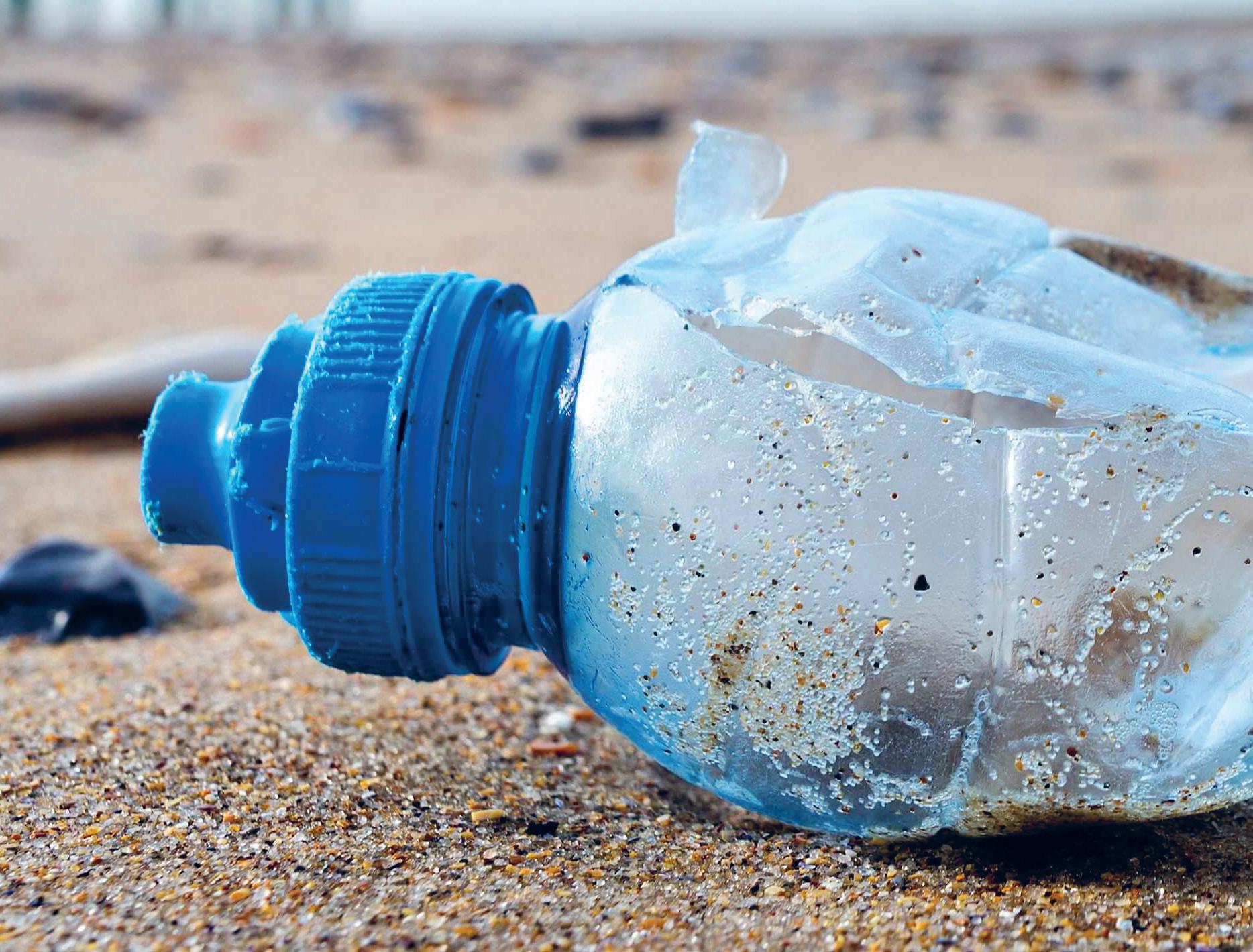
GAME-CHANGER FOR RECYCLING
Scotland’s DRS will also help us tackle the single-use, throwaway culture. It’s a proven behaviour change initiative, that incentivises us all to do the right thing. It is a significant milestone towards a circular economy and is one piece of a broader platform of change to transition away from a makeuse-dispose society.
The scheme will result in more bottles and cans being recycled and will produce a better quality of recyclate.
The separated collection methods required as part of

10 DRS: THE SUSTAINABILITY BENEFITS
SCOTLAND’S NEW DEPOSIT RETURN SCHEME WILL PLACE THE COUNTRY AMONG THE WORLD’S TOPPERFORMING SCHEMES WITHIN THREE YEARS, SAYS ZERO WASTE SCOTLAND.
Scotland’s DRS will make closed loop recycling much more viable. This will result in significant energy savings and reduced carbon impact.
Scotland’s DRS aims to capture an estimated 1.5bn drinks containers each year for recycling, potentially almost doubling the amount currently recycled. It will increase the quality of recycled material collected here.
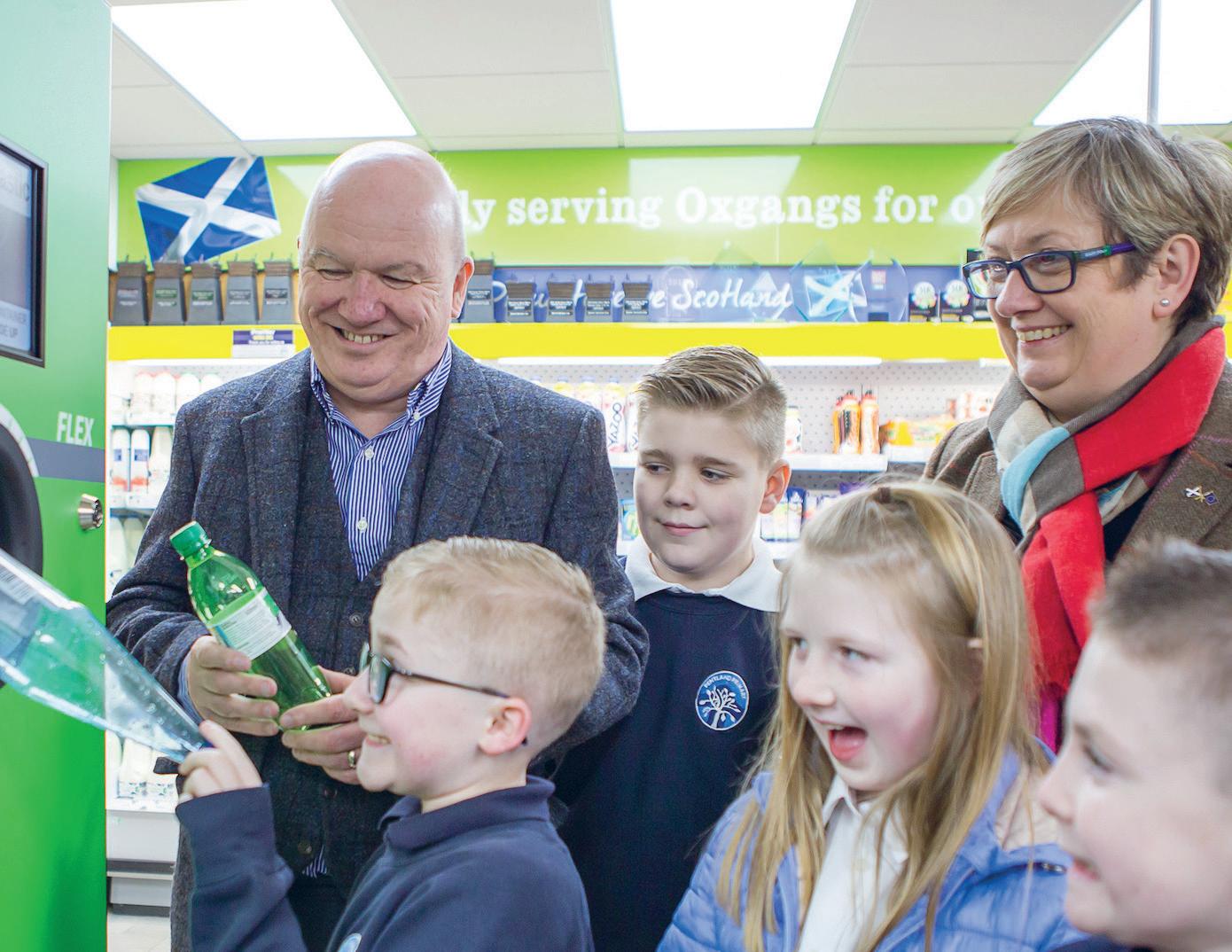
PREVENTING LITTER
As Scotland’s tourism industry contributes £4bn to the economy, it is vital that we reduce the litter we see in our countryside, towns, and waterways for both residents and tourists alike. Deposit return has the potential to greatly decrease our litter rates, ensuring that our landscape is kept beautiful for everyone to enjoy.
Independent experts at Eunomia estimate that more than 140,000 plastic and glass bottles and drinks cans are littered unnecessarily every day in Scotland. The scheme will tackle this visible source of litter that blights our town centres, country paths and burns, cutting it by a third. Reducing the amount of littered glass will protect both the public and wildlife.
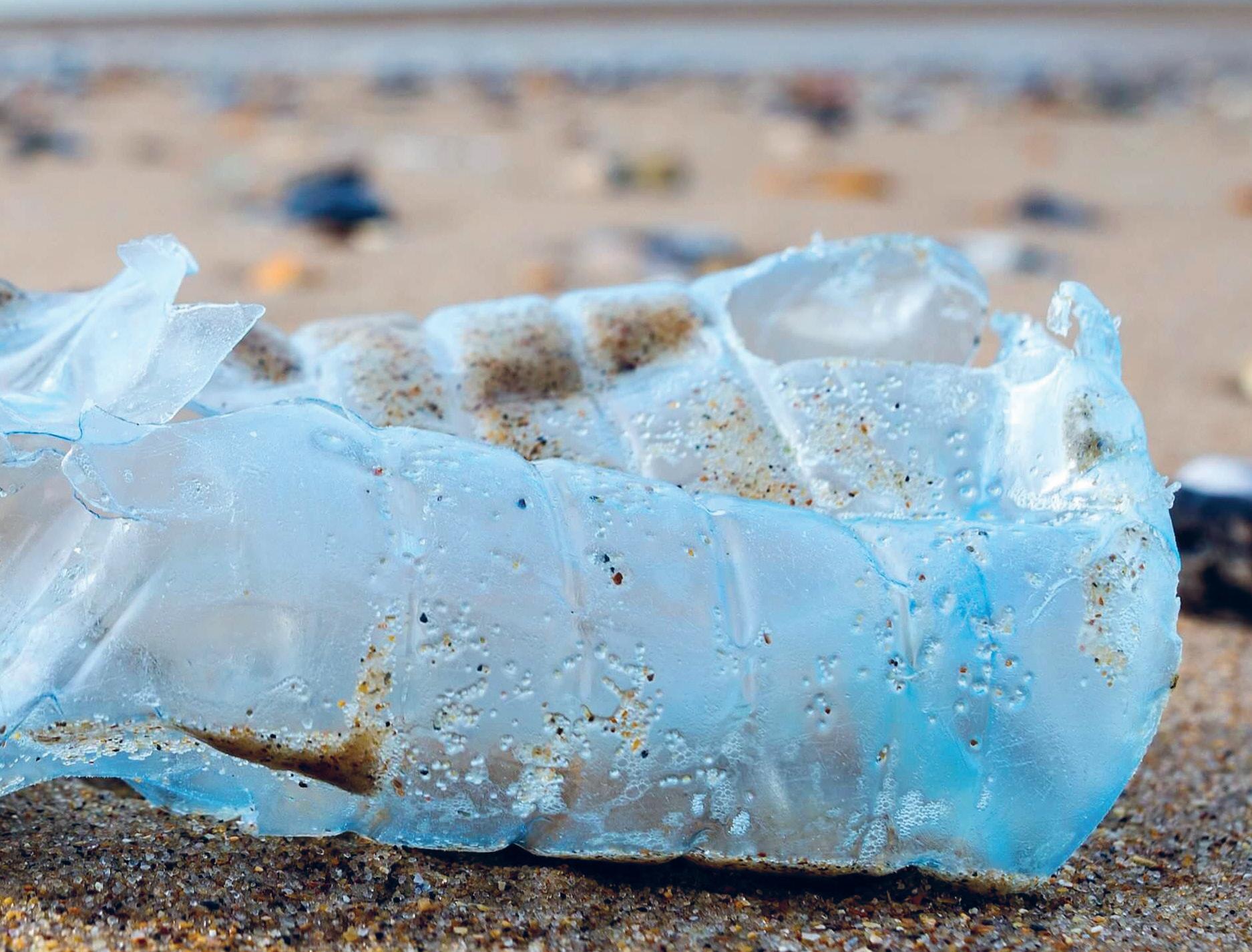
In addition, the scheme will reduce the £46m of public money spent cleaning up litter every year, and the wider negative impacts of litter – including on local businesses, house prices,
community wellbeing and crime – representing at least a further £361m in costs to our society and economy.
ECONOMIC BENEFITS
The DRS offers direct economic benefits through litter prevention and reducing carbon emissions, as well as the potential for greater recycling and reprocessing opportunities here in Scotland.
COMMUNITIES WILL BENEFIT
Schools and other community organisations will be able to get involved by registering to act as return points.
In addition, the scheme will create jobs in Scotland, it is estimated that roughly 500 jobs will be created across the country in bulking centres alone.
The deposit return scheme could reduce the amount we spend as a result of litter, allowing this money to be redirected towards other community amenities.
11 DRS: THE SUSTAINABILITY BENEFITS
A brief global history of DRS
TOMRA OFFERS A RAPID-FIRE HISTORY OF DEPOSIT RETURN SCHEMES AROUND THE WORLD AND EXAMINES HOW EFFECTIVE THEY CAN BE IN TRANSFORMING RECYCLING RATES.

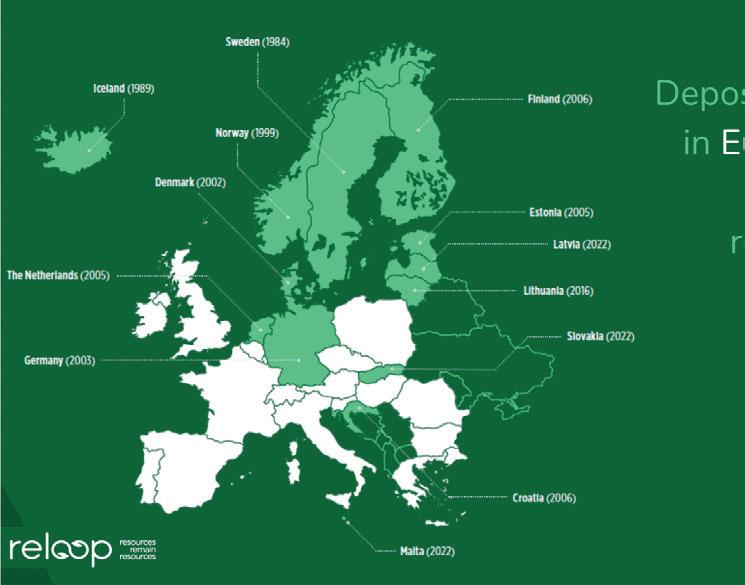
Plastic has been creating environmental challenges ever since its conception and countries around the world have been implementing Deposit Return Schemes as a means of finding a solution.
Though not at first as sophisticated as in modern days, the first systems were introduced on the back of challenges presented by the amount of waste single-use PET bottles created and the appetite to capture back the value of plastic by re-using it.
FIRST SOLUTIONS
Kerbside collection was the first step towards the recycling revolution. Ontario was the first place in the world to implement it, in a deal which saw the soft drink industry provide seed financing for the programme.
That created a chain reaction across the world, eventually becoming a legal requirement for municipalities; however, many authorities felt kerbside collection wasn’t always proving cheaper than disposal, and so had to come up with a different solution.
Meanwhile, another part of Canada was introducing the Litter Act in 1970, designed to reduce the burden of litter control. This saw British Colombia become the first place in the world to roll out a mandatory refund system for beer, soft drink cans and bottles. The trailblazing system required customers to pay a deposit at the point of sale when buying a bottle or can, and the money was returned to them in full when they brought the empty container back to a collection point.
This was the world’s first government-legislated deposit return system, according to Tomra.
Wolfgang Ringel, Senior Vice-President of Group Public Affairs at Tomra, says: “The first bottle deposits were introduced for obvious economic reasons. When they later became legislated, this was also in response to the plastic waste problem and the burden on municipalities.
“As the litter problem grew, it also meant there was a reputational issue for producers to consider. For example, the Ocean Conservancy produces an annual report on litter
statistics that includes a breakdown of litter by beverage brand, and that sort of reporting is a powerful tool in accountability and driving change.”
RAPID GROWTH
Throughout the 1970s, similar schemes were adopted in other parts of Canada, Australia and the US.
In Europe, Sweden became the first country to introduce deposits in 1984, starting with cans. In fact, Scandinavia was a region that embraced DRS early on, with both Denmark and Norway adopting schemes.
Elsewhere, South Australia rolled out a deposit return system in 1977, while in the US 10 states implemented bottle bills; Oregon was first in 1972. Barbados was the first across Oceania and the Caribbean in 1986.
Since them, more jurisdictions and countries came on board, with the last 10 years having seen particularly rapid growth in an effort to address the crisis of waste and pollution.
Meanwhile, in May 2020, South Korea introduced a deposit system to deal with the challenge posed by coffee cups and takeaway food containers.
EUROPEAN TRAILBLAZERS
On the continent, almost all collection systems are based around a return-to-retail model. This means that drinks retailers are legally responsible for the recovery of empty containers, which are then either reused or recycled.
12 GLOBAL PERSPECTIVE
Alternatively, a return-to-depot system is more popular in the US and Canada, with Iceland being the only European country to use this model, which involves consumers returning empty containers to a collection centre. Slovakia and Malta were some of the latest countries to implement deposit return schemes.

Launched in late 2022, Malta introduced the initiative with the aim of increasing recycling rates from 20% to 90%. The DRS is operated by BCRMS Malta, a licensed not-for-profit private operator of the country’s Beverage Container Refund Scheme and Sensoneo, a waste management solutions firm, providing a DRS IT service for the scheme.
The company had previously run the same IT system in Slovakia, which became the 11th European country to launch
a DRS on 1 January 2022. According to the company, since it came online, the scheme has facilitated the return of 100 million plastic bottles and metal cans by Slovakia’s population of more than five million people in its first five months of operation.
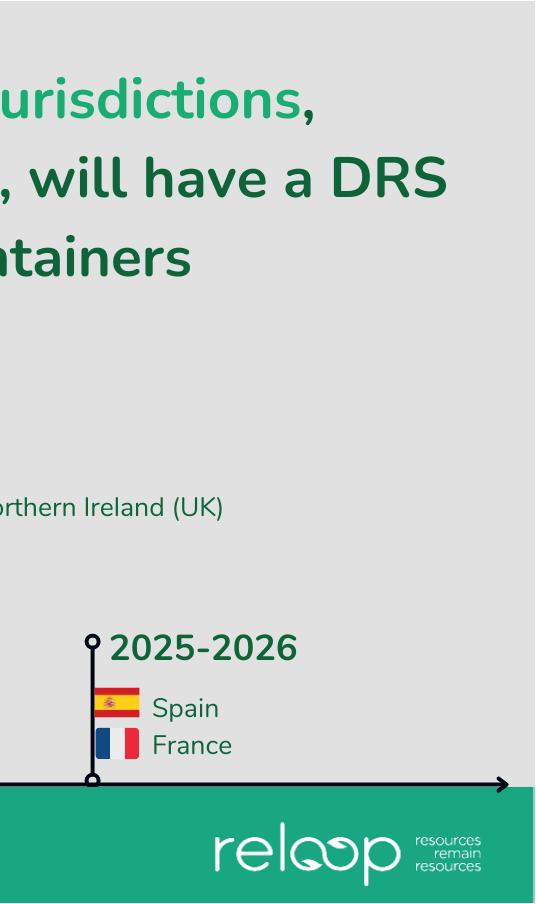
Meanwhile, in the Baltics, Latvia also launched a DRS scheme this year in partnership with Tomra. Estonia has the longest-running DRS in the region, with the system also being a model for Scotland. In 2018, Scotland’s Have You Got the Bottle campaign organised a trip to Estonia to see its DRS in action and support the campaign for the introduction of a Scottish DRS.
COMPARING OUTCOMES
According to the Global Deposit Book, a report that provides an overview of deposit return systems for single-use beverage containers, a more expensive deposit equates to higher rates of return. With deposits worth less than 7 US cents per container, the average return rate is 68%, rising to 81% with deposits between 7 and 9.9 US cents, and to 88% with deposits between 10 and 15 US Cents.
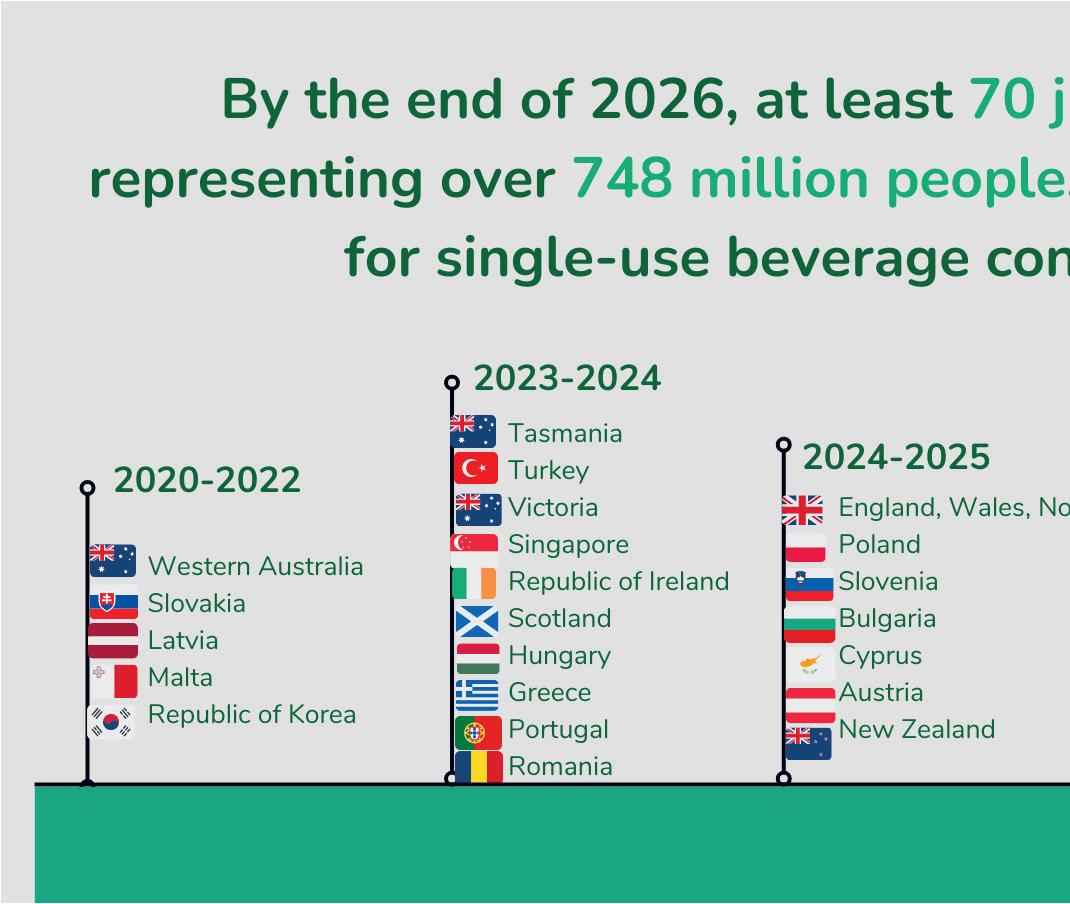
Europe boasts some of the world’s most successful programmes, with return rates as high as 94% and deposits equalling 15 US cents or higher.

13 GLOBAL PERSPECTIVE
NHS Grampian DRS trial breaks new ground
WORKING WITH TOMRA, ABERDEEN ROYAL INFIRMARY HAS BECOME THE FIRST HOSPITAL IN THE UK TO HOST A REVERSE VENDING MACHINE.
Aberdeen Royal Infirmary has become the first hospital in the UK to host a Reverse Vending Machine (RVM), as NHS Grampian works with TOMRA to undertake a trial of the technology in advance of the Deposit Return Scheme (DRS) launching across Scotland in August this year.

Under the scheme, all buildings which include retail catering outlets must either house an RVM or be part of a local network for the collection of drinks containers.
The trial launched last month and saw a TOMRA RVM situated at the main hospital entrance. Customers using the machine receive a voucher worth 5p per item, up to the value of £2.50, to be spent in the hospital’s Aroma Cairngorm café within two weeks.
Neil Duncan, Waste Management Officer for NHS
Grampian, said: “I am delighted Aberdeen Royal Infirmary is hosting this trial and it’s my hope it will reduce litter on site and promote recycling. NHS Grampian is committed to being a sustainable organisation as part of the Plan for the Future; this trial is us putting our words into action.
“Under the terms of the DRS, we will have to plan to either install machines or join a local network at Woodend, Dr Gray’s Hospital, and Royal Cornhill Hospital. This trial will help us decide on the best course of action. We will also be sharing our experience with colleagues at other health boards across Scotland.”
When the deposit return scheme comes into effect the refund will be 20p per item and people will be able to choose between a voucher or a cash alternative. During the trial there will be no cash alternative and the return will be 5p per item.
14 TOMRA
Derick Murray, non-executive board member, added: “As the board’s Sustainability Champion, I am really pleased to see Aberdeen Royal Infirmary leading the way with this trial. We want to support change in the community, as well as within our own organisation, and this is a great example of that. I’m looking forward to seeing how this pilot develops.”
John Lee, TOMRA’s Vice-President for Public Affairs in the UK and Ireland, said: “We are delighted to be involved in this highly innovative project. NHS Grampian is to be congratulated for taking the lead on this, giving hospital staff, patients and visitors the opportunity to reduce litter and boost recycling.

“NHS hospitals could play a key role in the success of deposit return once the scheme goes live. This project is paving the way for that success.”
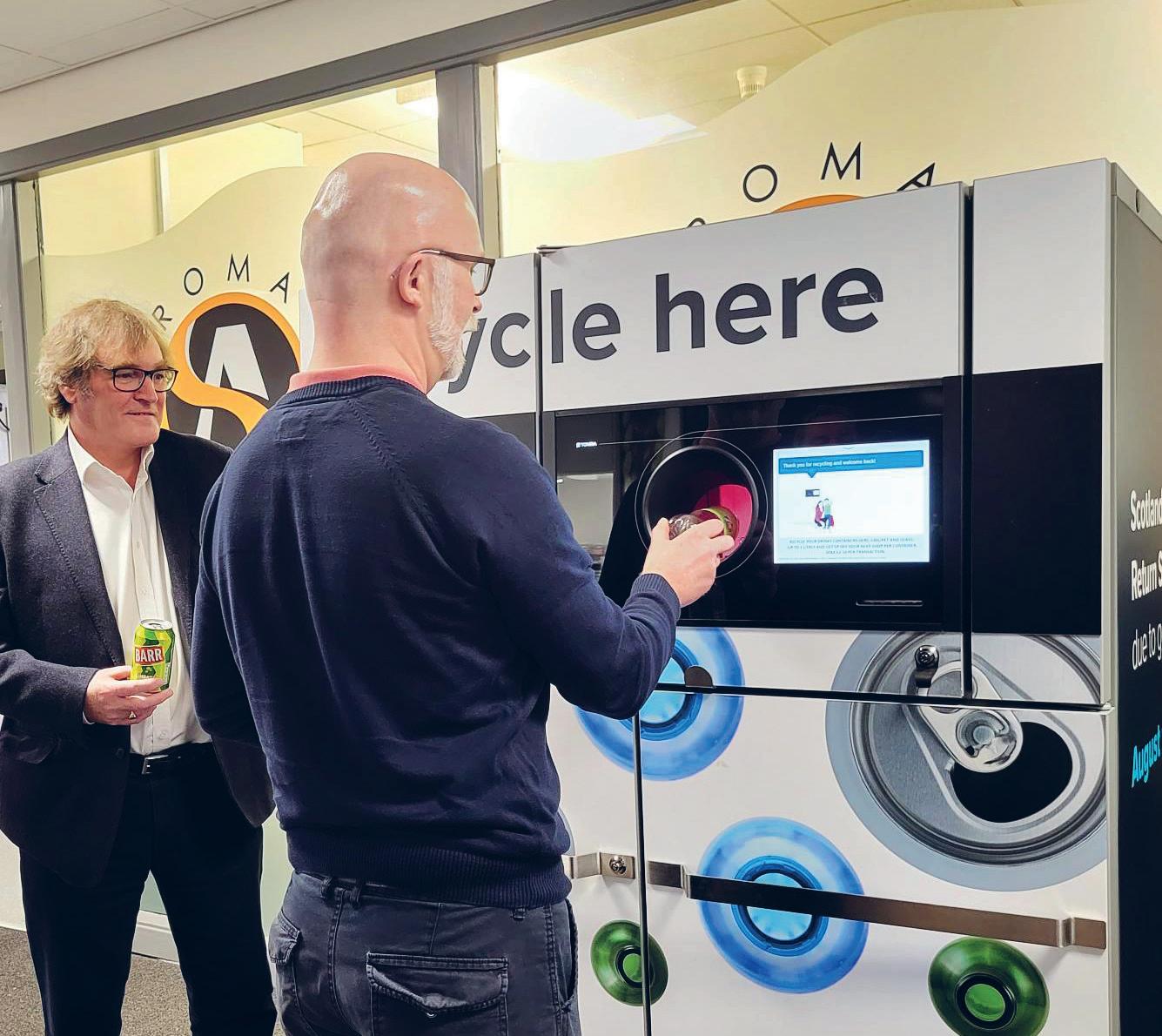
15 TOMRA
DRS: myth-buster
DRS SCHEME ADMINISTRATOR CIRCULARITY SCOTLAND OFFERS
ITS VIEW ON SOME OF THE MISCONCEPTIONS AROUND HOW THE NEW SCHEME WILL WORK.
Scotland’s deposit return scheme (DRS) will go live from 16 August 2023, revolutionising how Scotland recycles.
By 2025 the DRS aims to capture at least 90% of all containers included in the scheme for recycling, marking an environmental milestone in Scotland’s journey to a circular economy and greener place to live for generations to come.
Circularity Scotland was set up by industry to run the DRS on their behalf. This means managing the financial and logistical elements of the scheme, collecting containers from return points, reimbursing deposits, and ensuring all materials are recycled.
Introducing a scheme of this scale that requires businesses to change the way they operate will understandably bring with it a lot of questions and misconceptions. We have brought some of these together with answers to help provide clarity to businesses, and help them properly prepare for the part they will play in Scotland’s DRS.
EVERY RETAILER SELLING DRINKS IN SINGLE-USE DRINKS CONTAINERS MUST ACT AS A RETURN POINT
Under the DRS regulations, any business that sells drinks in single-use drinks containers must act as a return point – but they can apply for an exemption. Last year, the Scottish Government published guidance to streamline the exemption process, meaning many smaller retailers will be able to opt out of acting as a return point from March, when retailer registration opens.
I MUST INSTALL A REVERSE VENDING MACHINE (RVM)
Whether or not you install an RVM is for individual retailers to decide. Generally, an RVM only makes economic sense if you are handling a large volume of returns, thousands per week. If in doubt about whether an RVM is right for you, we advise you to act as a manual return point in the first instance until you have a clearer idea on the volume of returns you will be handling.
THE RETURN HANDLING FEE (RHF) IS TOO SMALL, PENALISING SMALLER RETAILERS
The RHF is the highest of any similar scheme in the world, and in January elements were increased by a further 19%. The RHF model was developed in close collaboration with independent advisors using data from retailers across Scotland, as well as input from other deposit return schemes operating across the world.
CONSUMERS CAN TAKE BACK AN EMPTY CAN OR BOTTLE PURCHASED OUTSIDE OF SCOTLAND AND STILL GET 20P BACK
The DRS only covers drinks containers purchased in Scotland so you would not get 20p back on a bottle or can that was purchased anywhere else. This does not mean producers based outside Scotland, or those importing drinks into the country, won’t be able to sell their products in Scotland, they will just need be registered as part of the scheme.
THE DRS IS NOT VIABLE FOR ISOLATED COMMUNITIES
The DRS must operate effectively in and for every community in Scotland at all times of the year. We understand the challenges of operating in more remote and hard-to-reach areas and are working with government, industry and our official logistics provider Biffa to develop specific solutions for these areas. Data is currently being analysed to determine the most appropriate service levels and logistics solutions. Bear in mind that many remote communities already have shops and hospitality premises and rely on stock being brought in and waste taken out – DRS will be very similar to what is already happening.
GLASS WILL RUIN THE SCHEME
Glass litter is one of the biggest polluters in Scotland and glass is one of three main materials used to make single-use drinks containers. It’s because of this that the Scottish Government has included it in the regulations. It has been estimated that the DRS will capture somewhere in the region of 504 million glass bottles each year, reducing CO2 emissions by more than 50,000 tonnes annually.
CIRCULARITY SCOTLAND
16
BUSINESSES WILL BE FINED IF DRS FAILS TO GO LIVE ON 16 AUGUST 2023
Only the very largest companies – those that produce more than 10 million units – are being asked to pay fees if there is any delay to the scheme, and these would amount to less than what they would pay if the scheme was live. Investment to build the required infrastructure has come from many sources, but since DRS is a producer responsibility to build and operate, it is only fair that producers take the risks associated with any unlikely delay. The vast majority of producers will not be liable in the event that the scheme is delayed.
Circularity Scotland does not underestimate the challenges involved when introducing a scheme of this scale. As the project grows in complexity and immediacy, businesses are
understandably questioning their responsibilities. We are working at pace with businesses, large and small, in every corner of the country to help them prepare for the scheme, ensuring the DRS operates effectively.
We’ve already been able to reduce producer fees by up to 40% while still providing the highest return handling fee anywhere in the world. We’ve also just announced further measures to help smaller producers, who we know have been concerned about the cashflow impacts of the scheme.
To address these concerns, we have introduced a £22m package of measures, which will provide two-month credit terms and removing the day one and month one charges for producers.
Any business with questions about their obligations under Scotland’s Deposit Return Scheme should contact Circularity Scotland’s customer service team on 0141 401 0899 or via the contact form on the circularityscotland.com website.

17 CIRCULARITY SCOTLAND
NEW PACKAGING FOR A NEW ERA
WITH DRS ON THE HORIZON, MANY PRODUCERS HAVE ALREADY BEEN DOING THEIR BIT TO REDUCE THE IMPACT OF THEIR PRODUCTS BY IMPROVING THE SUSTAINABILITY CREDENTIALS OF THEIR PACKAGING. HERE ARE A FEW EXAMPLES....
HEINEKEN GETS A GRIP ON SUSTAINABILITY
Heineken has launched a more robust version of its Green Grip sustainable packaging solution.

The Green Grip performs the same function as traditional plastic can rings but without the need for single-use plastic. It first launched in August 2020, replacing plastic can rings with a 100% recyclable cardboard topper for multipacks, and saving 336 tonnes of single-use plastic since its debut.
The new packaging forms part of a wider £14m investment and follows months of research and development. A dedicated team trialled several solutions and found a double layer of cardboard to be the best performing and easier for both retail staff and consumers to handle.
The all-new double-layered Green Grip is rolling out across all Heineken brands in multipack cans, including Heineken, Birra Moretti, Strongbow, and John Smith’s.
Last year, as part of its Brew a Better World sustainability programme, Heineken announced its commitments to fully decarbonise its production sites by 2030 and its full value chain – including packaging and logistics – by 2040.
LEVI ROOTS LAUNCHES RECYCLABLE CARIBBEAN CRUSH BOTTLE

to consumers the recyclability of the packaging, making it easier for them to dispose of responsibly.
Jenny Powell, Brand and Innovation
Levi Roots has introduced fully recyclable clear plastic bottles for its Caribbean Crush variant – alongside updated labelling.
The move from green to clear bottles is intended to aid consumer navigation, and the introduction of the new packaging unifies the full Levi Roots range to offer 100% recyclable bottles, including lids. The clear plastic bottles also signpost
Controller at brand owner Nichols, said: “Levi Roots is a well-established brand within the Nichols plc family and we’re delighted to launch our 100% recyclable Caribbean Crush bottles into the market.
“As a business, we want to ensure that we’re creating a happier future for our planet by doing things the right way. By making the bottle clear we’re able to make it easier for consumers to navigate the recyclability of the products, as well as ensuring we align the look and feel across all of the Levi Roots flavour variants.”
Accolade unleashes Wise Wolf
Accolade Wines launched Wise Wolf, a new carbon neutral wine range under its Banrock Station brand that comes in bottles made using 100% recycled glass.
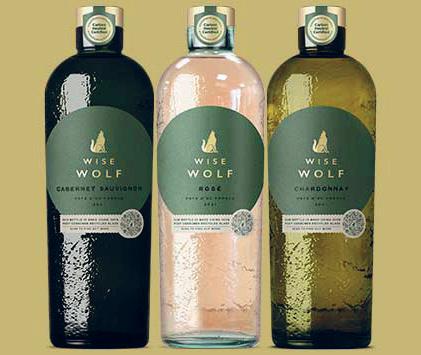
As well as the environmentally friendly bottles, the labels are made from 100% recycled paper, the closures are 100% recycled plastic and the outers are made from 100% recycled paper pulp.
Every element of the packaging has been carefully considered, and shoppers are invited to learn more about each part by scanning an on-pack QR code and visiting wisewolfwines.com.
With almost three-quarters (71%) of wine drinkers prepared to make lifestyle changes for the environment, Wise Wolf expects to meet consumer demand with younger wine drinkers increasingly aware of the impact of their consumption.
18 REPACKAGING SHOWCASE
Barr moves Irn-Bru range into 100% recycled bottles

Barr Soft Drinks rolled out 100% recycled plastic (rPET) across all its 500ml Irn-Bru and Rubicon products in 2022.




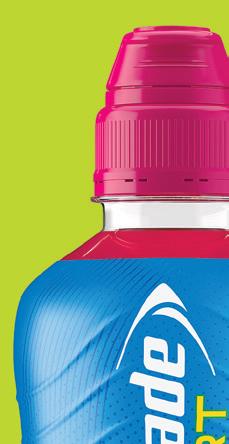
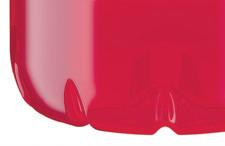
The move formed a crucial part of a wider initiative, No Time To Waste, that brings together net zero, plastic and packaging, waste, water and sustainable sourcing workstreams.
Adrian Troy, Barr’s Marketing Director, commented: “We recognise that we have a responsibility to protect our planet and we know how important it is that we act now to try and reduce our impact on the environment.

“It has always been really important to us to make a positive contribution to society and behave responsibly as a business; respecting the environment has been a key pillar of this work.
“Sustainability is also a key issue for our consumers. 58% of consumers say that environmental issues are important to them, that’s up 5% from a 2020 study, which is encouraging to see.”
Lucozade Sport dons new sustainable kit

Lucozade Sport unveiled a new kit with a reduced plastic sleeve on its bottles as part of its continued focus to become more sustainable.

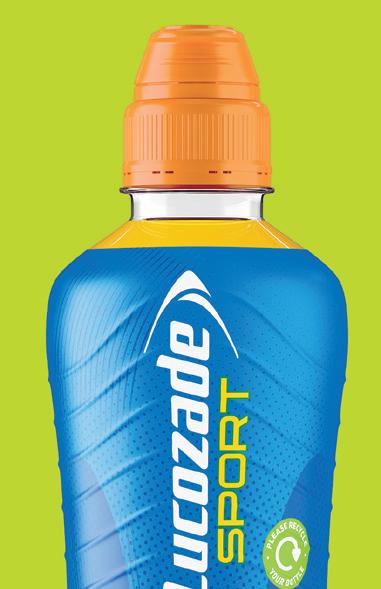
The new-look sleeve follows Suntory Beverage & Food GB&I (SBF GB&I)’s £7.8m investment to make its packaging more sustainable, as part of the company’s Growing For Good vision that focuses on positive change for businesses, people and the planet.
The reduced sleeve alone will save 101 tonnes of virgin plastic being produced annually and allows the bottle to be more easily identified and sorted into the correct waste stream, helping ensure more Lucozade Sport bottles are turned back into bottles within the current UK recycling infrastructure.

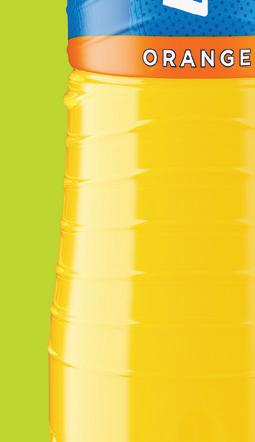
The Lucozade Sport sleeve redesign follows a major packaging update on the Ribena brand, including launching paper straws for Ribena cartons, as well as a move to 50% transparent sleeves across the Lucozade Energy range to allow them to be recycled more easily back into bottles. Lucozade Sport’s new kit helps bring SBF GB&I closer to its goal of making all its plastic packaging sustainable by 2030 and is also a key step toward the company’s ambition of reaching net zero emissions by 2050.

Tom Bell, Head of Marketing for Lucozade Sport at SBF GB&I, said: “This is a key move for the Lucozade Sport brand and, more broadly, for SBF GB&I as part of our Growing For Good vision. The new sleeve not only makes Lucozade Sport bottles easier to recycle – and therefore turned more easily back into bottles – but equally benefits retailers by being more eyecatching and striking on shelf, helping shoppers to find their favourite isotonic drink more easily.”
Molson Coors trials low-carbon glass beer bottles
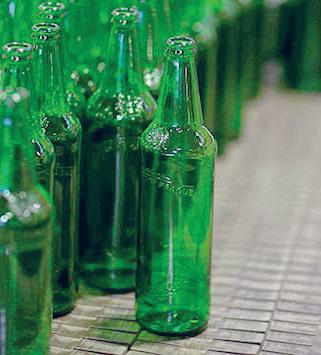
Molson Coors launched a low-carbon glass beer bottle, following a trial in partnership with Encirc, that reduced the carbon impact of its bottle production by up to 90%.
The trial, produced two million glass bottles for its Staropramen brand, which are now available across the UK. The bottles are manufactured using up to 100% cullet – recycled or waste glass – up from 75% previously used in its green glass bottles. As well as significantly increasing the recycled content of the bottles, the trial uses renewable and sustainable biofuels rather than those traditionally used in the glass production process. As a result, the carbon footprint of each bottle is reduced by up to 90%.
Molson Coors and Encirc have been bottling partners for almost 25 years, and this latest initiative forms part of Molson Coors’ wider sustainability goals, which include reducing its carbon emissions across its global operations by 50% by 2025.
19 REPACKAGING SHOWCASE
Talking to consumers
MANY MAJOR SUPPLIERS AND PRODUCERS HAVE ALREADY STARTED COMMUNICATING DIRECTLY WITH CONSUMERS AROUND RECYCLING, LAYING THE GROUNDWORK FOR A MAJOR CONSUMER EDUCATION CAMPAIGN FROM CIRCULARITY SCOTLAND AROUND DRS LATER THIS SUMMER.
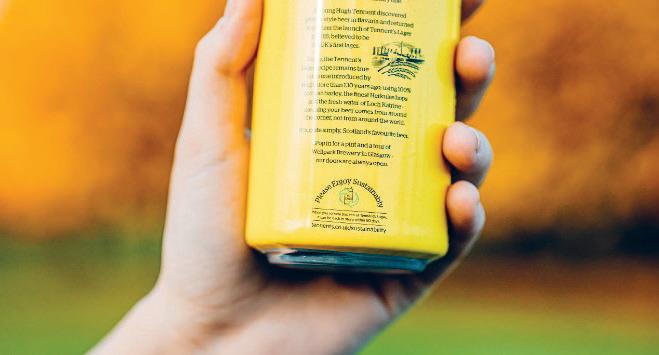
Tennent’s launches sustainability can
Tennent’s Lager has unveiled a new can featuring a new ‘drink sustainably’ message.
Coca-Cola demystifies plastic recycling
The Coca-Cola Company is breaking down plastic recycling to demystify the process with an animated film narrated by William Nye, who is better known, certainly to American consumers, as Bill Nye the Science Guy.
The stop-motion film features an animated—and recycled— likeness of Nye who explains the end-to-end recycling process. The film takes viewers on the circular journey of a plastic bottle, starting from the time it’s placed in a recycling bin to returning to the shelf as a 100% recycled bottle.
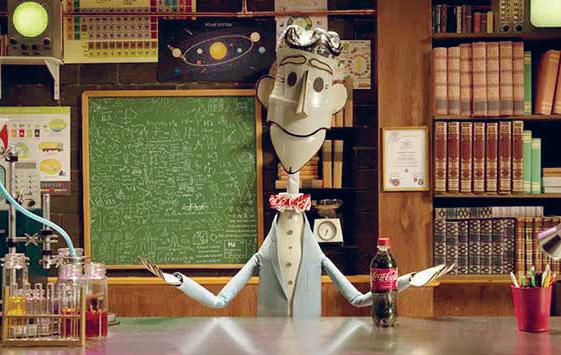
The film was shot in Cheshire on a set made with recyclable and recycled materials. Plastic bottles, labels and cardboard were incorporated into all aspects of the production – from Nye’s puppet caricature made from cut-up plastic Coca-Cola bottles to trees made from green Sprite labels, to conveyor belts designed from recyclable cardboard.
The company is adding a ‘Please Enjoy Sustainably’ message, initially across all its canned packaging, in a bid to encourage recycling ahead of the introduction of Scotland’s deposit return scheme. It hopes the more direct call to action on the 120 million cans the brewery fills on average every year will encourage drinkers to think twice about their recycling habits.
Cameron Matthews, Tennent’s Senior Brand Manager, said: “As Scotland’s favourite lager, we take recycling
and sustainability very seriously, and recognise the responsibility we have to encourage consumers to consider their own environmental impacts. We need to make this as easy as possible for everyone, and adding something as simple as a sustainability prompt on our packaging can keep our planet’s best interest front of mind.
“When recycled, aluminium can be back on shelf within 60 days, which is a fantastic example of the circular economy in action – with impact on litter and CO2 emissions. It may seem like such a simple action, but by recycling cans, everyone can make a big difference.”
Nescafé goes full sustainability
Nestlé’s new global campaign for instant coffee features a sustainability message.
The brand’s instant coffee was invented as a way to make use of leftover coffee beans and the advertisements highlight that it is 100% responsibly sourced.
Meritxell Alegre, Nescafé Pure Soluble Business Lead Zone Europe, said: “Consumers want to know what brands are doing now, not only what they are going to do in the future. We needed to show tangible evidence of our commitments and achievements from beans to cup.”
20 DRS CONSUMER AD CAMPAIGNS
BrewDog continues commitment to planet-friendly beer
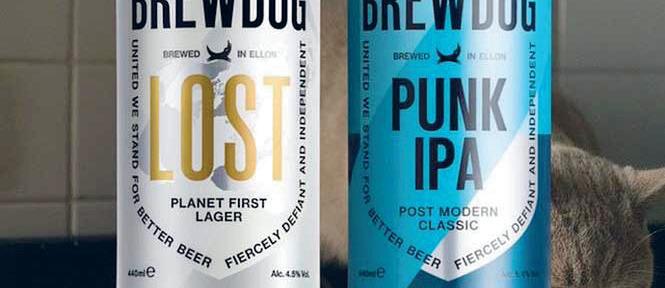
Scottish brewer BrewDog ramped up its commitment to planet-friendly beer with a sustainability-focused TV ad campaign.
The Ellon-based brewery’s ‘The Planet’s Favourite Beer’ campaign celebrated Brewdog’s pioneering environmental commitment to being the world’s first carbonnegative brewery.
The campaign, which aimed to reach 26m adults throughout August and September, showed the different lives that its customers – and even non-customers – lead, and highlights that its carbon-negative credentials mean that it is here for the planet and all its inhabitants.
BrewDog offsets double its entire carbon footprint through tree planting initiatives around the world. It also brews using only renewable energy, uses packaging made from easily recycled materials, prioritises
local ingredients, and transports its beer in the UK’s first electric 19-tonne truck.
The ad campaign set out to challenge the stereotypes in traditional beer advertising, “take the worthiness out of woke”, and offer a comical take on the array of people inhabiting planet earth.
The TV and video-on-demand advert was supported by out-of-home, digital, social and print ads which reinforced BrewDog’s ecological message. Furthermore, the production of all assets in the campaign was offset through planting trees, making it a sustainable campaign in every sense.
Special Projects Director Lauren Carrol said: “The campaign reinforced BrewDog’s commitment to having a positive impact, both on our diverse audience and the planet. We’re proud to be a beer for all and to serve our amazing global community.”
Glacéau Smartwater highlights sustainability credentials
Coca-Cola Europacific Partners (CCEP) launched a campaign for its Glacéau Smartwater brand to “highlight the brand’s sustainability credentials and support the return of the on-the-go mission”.
The campaign will see messaging appear on-pack to remind consumers that the bottles are now made from 100% recycled PET plastic.
Phrases including ‘I’m not new to this’, ‘Have we met before?’ and ‘Hi there, me again’ will appear on 600ml and 850ml packs during the summer, helping to drive standout in the
Barr Soft Drinks engages consumers on recyclability and recycling
Barr Soft Drinks supported the introduction of 100% recycled plastic (rPET) across all its 500ml Irn-Bru and Rubicon products with an advertising campaign to engage consumers on recyclability and recycling.
In addition, the company introduced clear on-pack labelling to help inform shoppers about the new bottle materials.
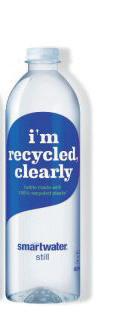
Adrian Troy, Barr’s Marketing Director, said: “We recognise that we have a responsibility to protect our planet and we know how important it is that we act now to try and reduce our impact on the environment.
“It has always been really important to us to make a positive contribution to society and behave responsibly as a business; respecting the environment has been a key pillar of this work.”
The move is a part of a wider initiative, No Time To Waste, which launched last year.
chiller and tap into shoppers’ “growing appetite” for products that use recycled materials.
The launch of the new pack designs was supported by a marketing campaign in July and August, including social media and out-of-home activity.
Martin Attock, Vice President for Commercial Development at CCEP GB, said: “Sustainability is at the heart of everything we do for Glacéau Smartwater and this has built a strong brand equity with consumers, especially young adults –who are frequent bottled water shoppers.”
21 DRS CONSUMER AD CAMPAIGNS
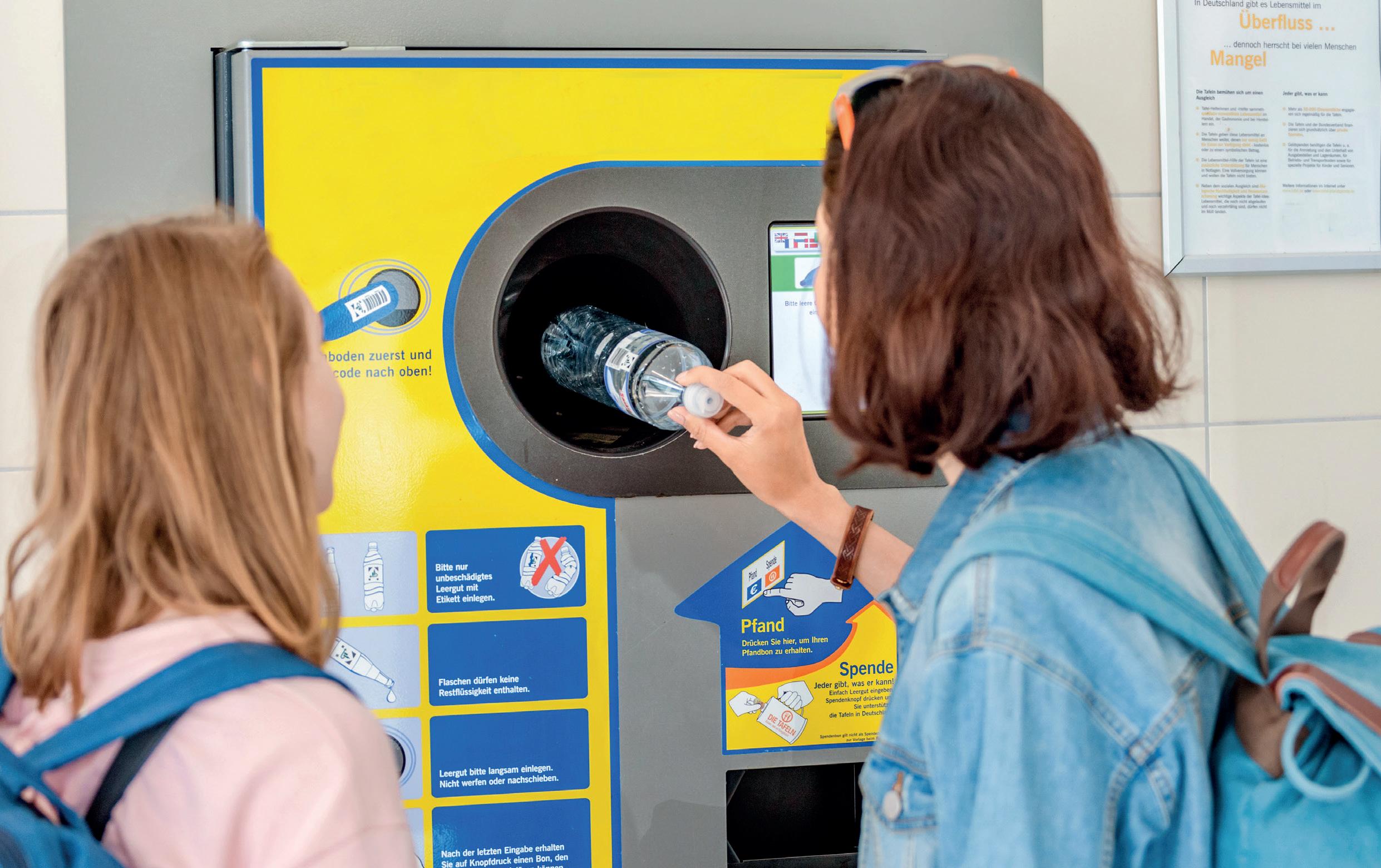




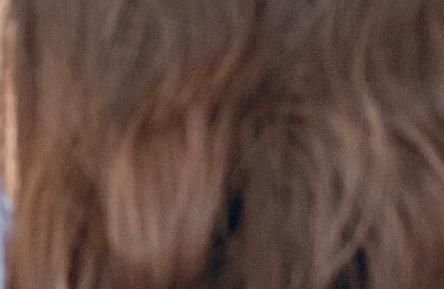












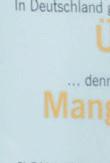





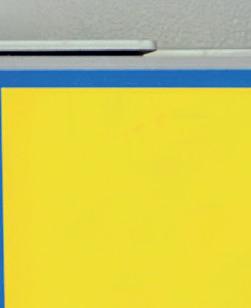


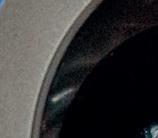










































































































































*SBF GB&I DRS Household Habits research 2022, mini-public study in a DRS world FREE white paper from Suntory Beverage & Food GB&I. www.suntorybeverageandfood-europe.com/ en-GB/gbi/sustainability/planet/DRS/ DEPOSIT RETURN SCHEMES (DRS): What’s in store..? 88%* of people rethink their relationship with plastic bottles after seven weeks. New study explores what it means for retailers and their shoppers.
GROWING FOR GOOD

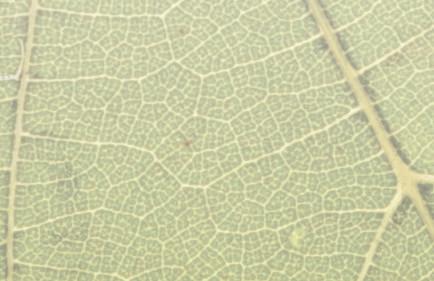


SUNDAY BEVERAGE & FOOD GB&I IS COMMITTED TO DRIVING POSITIVE CHANGE FOR LOCAL RETAILERS IN SCOTLAND AND THEIR CUSTOMERS – AND SAYS HOW WE RECYCLE AND REMOVE PLASTIC IS KEY TO THAT AMBITION.
BY MATT GOULDSMITH, CHANNEL DIRECTOR, WHOLESALE, SUNTORY BEVERAGE & FOOD GB&I
Our team is passionate about our Growing for Good vision. How we recycle and remove plastic is a key part of this vision. We are designing our drinks packaging for circularity, as closing the loop on the recyclability of plastics is key to its sustainable use. To that end, we are making sure that all our packaging is recyclable by 2025 or sooner.
We’ve invested almost £8m in making our brands more sustainable. Lucozade Sport bottles made from 100% recycled plastic (rPET) feature a smaller label, to reduce the volume of virgin plastic in the marketplace. The 500ml Ribena bottle was similarly redesigned, an key step on our journey towards 100% recyclable packaging by 2025.





We are also reducing excessive and unrecyclable packaging across our brands. Ribena was the first major UK soft drinks brand to replace plastic straws with paper ones – preventing up to 16 tonnes1 of plastic being produced per year – and last year we made our Lucozade Energy bottle wrappers transparent so that they could be recycled.
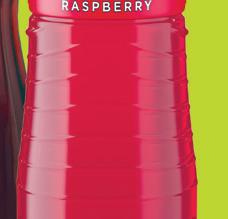


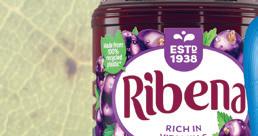


Our Growing for Good vision is driving the work we do to minimise our environmental impact. Sustainability matters. 92%2 of consumers say sustainable businesses should be standard and one-third of shoppers (33%3) are now choosing to buy from brands that they believe are doing social or environmental good.


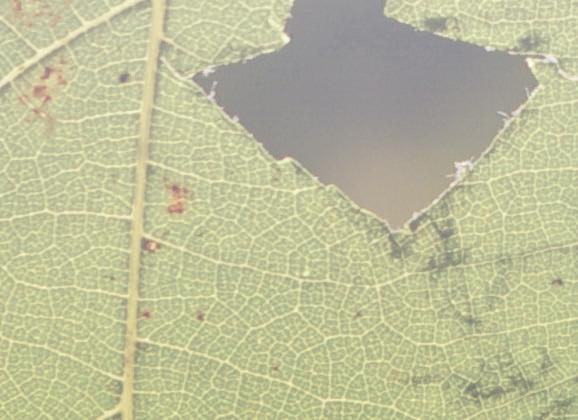


DEPOSIT RETURN SCHEMES










We want as many of our bottles as possible to be recycled as possible and that is why we support the introduction of effective deposit return schemes and are a founding member of Circularity Scotland.
Last year, we commissioned a white paper study on deposit return schemes called Deposit Return Schemes: What’s in Store? Our research found it takes just seven weeks for most shoppers to rethink their relationship with plastic bottles (88%) and to appreciate their value after living with the scheme.
[2]
[3]



As part of this we ran four behavioural studies with almost 8,000 people. Research included placing over 5,500 people in a virtual reality shopping environment to see how they would react when a theoretical deposit return scheme was introduced. Further studies focused on understanding how consumers lived with deposit return schemes.
We discovered that shoppers experience a three-stage mental shift when required to pay a deposit, which the company has categorised as Surprise, Review and Reset.
Surprise: Shoppers experience surprise at being asked to pay more for soft drinks in a retail environment and return items for a fee, which is currently set at 20p per item in Scotland.
Review: In the second stage, consumers review their relationship with materials like plastic bottles and learn how to adjust to the new scheme rules after having to re-evaluate the value of their drinks packaging.
Reset: And in the final phase, shoppers reset and change their behaviour towards materials like plastic bottles resulting in new routines and different choices.
Q Deposit Return Schemes: What’s in Store? can be downloaded from bit.ly/3IqUMK6.
Deposit Return Schemes: What’s in Store? can be downloaded from bit.ly/3IqUMK6.
[1] Annually SBF GB&I consume 40,000,000 straws equalling 16 tonnes by weight
The Innovation Group, The New Sustainability: Regeneration report, September 2018
Convenience Store magazine, 2019
23 MATT GOULDSMITH: SUNTORY BEVERAGE & FOOD GB&I
“Starttalkingtoyour shoppersatleastsixweeksaheadof DRSgoingliveaboutwhatiscoming.Let themknowwhyitisbeingintroduced, howtheycaninteractwithitandhowit willimpactthem.”
RVM SYSTEMS: THE SERVICE AND SOLUTIONS YOU NEED
RVM SYSTEMS OFFERS A WIDE RANGE REVERSE VENDING MACHINES ALONG WITH FLEXIBLE PAYMENT MODELS, ALL BACKED BY EXCEPTIONAL CUSTOMER SERVICE AND TECHNICAL SUPPORT.
 BY CLAUDIA MARSHALL, MD, RVM SYSTEMS
BY CLAUDIA MARSHALL, MD, RVM SYSTEMS
Moving to the UK several years ago I was – and I still am – horrified by the litter on the roads, especially single-use drinks containers. Having grown up in Germany and lived in Sweden, I had become very used to well-established Deposit Return Schemes (DRS). The return rates in Germany are up to 98%. So, it still seems to me that in the UK we aren’t only polluting the environment and nature but also literally leaving ‘money laying on the ground’.
As we approach the August launch date for Scotland’s DRS, more and more local retailers are learning about Reverse Vending Machines (RVMs) and how they are the most efficient solution to help businesses comply with this legislation. Some retailers have taken the early initiative and are looking upon the scheme as an opportunity to attract customers and to improve their sustainability credentials.
With offices and a showroom in Broxburn, near Edinburgh airport, and local Service Engineers and Product Experts offering nationwide support, RVM Systems is assisting businesses by guiding them through the steps to prepare for the DRS
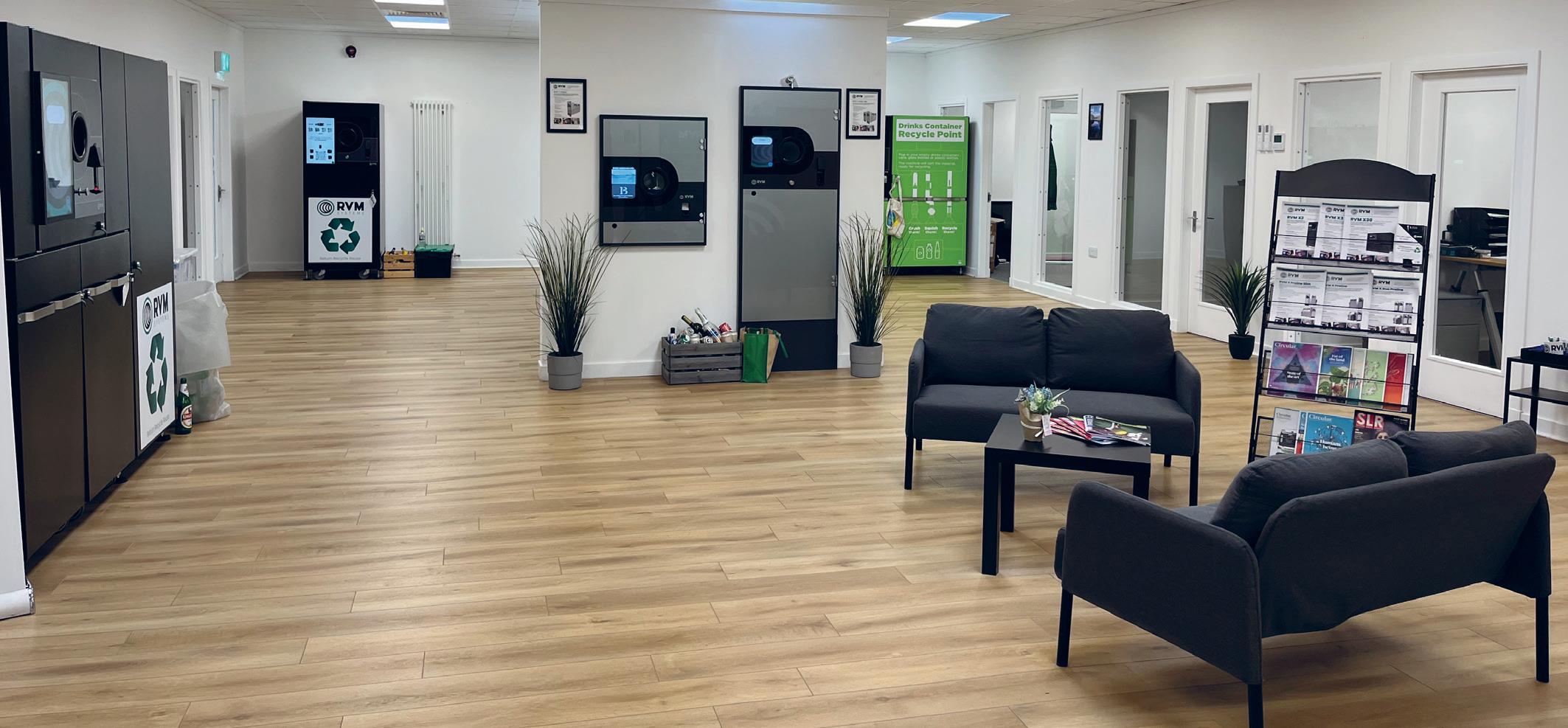
start date, allowing business owners to easily understand their obligations and find their best DRS solution.
RVM Systems presents various RVM automated solutions supported by the option of either purchase or a simple lease solution. We make the process painless for businesses, helping them to select the best RVM for their specific circumstances that will provide the required capacity while minimising the cost, and will meet DRS specifications.
We pride ourselves on our exceptional Customer Experience mindset, our highest level of technical support (remote and on-site), and our advanced technology.
RVM Systems offers a diverse range of reverse vending machines with several characteristics which distinguish RVM Systems from its rivals. Our solutions can offer advanced processing and compactor equipment, both for co-mingle and separation of containers as well as the highest storage capacity, overall taking up less room in the premises and costing on average 20% less.
24 SOLUTIONS: RVM SYSTEMS
For more information visit rvmsystems.co.uk/contact





A more sustainable world for future generations By encouraging consumers to recycle single-use containers, we help to limit waste, protect the environment and contribute to a circular economy Return Recycle Reuse To find out more visit us at RVMSystems.com or RVMSystems.co.uk or call our UK offices on 01506 537302 Get ready! On August 16th, 2023 Scotland’s Deposit Return Scheme will go live. With our long-term experience from existing DRS markets and our high technology RVMs automating the process of collecting, recognising, sorting, and storing of used beverage drink containers we deliver bespoke, efficient solutions and professional installations and service support. Visit us at our offices & showroom in Broxburn, just outside Edinburgh and view our portfolio of Reverse Vending Machines, speak to our Product Expert, and “test & try” our RVMs.
ENVIPCO: YOUR PERFECT DRS PARTNER
Scotland’s convenience sector will play a significant role in the Deposit Return Scheme, which goes live in August, thanks to higher-than-average shopper visits per week than supermarkets and most customers agreeing that local shops are better for the environment as more are visited on foot or are travelled to within a short distance.
Bottle returns will no doubt become part of the shopper mission to convenience stores ranking amongst other valued services like cash machines, parcels and bill payments, and providing a focal point for communities.

Not all convenience stores will be suitable for operating as a return point however, due to either store size or other health and safety issues, and retailers can apply for an exemption if this is the case or if there is another return point in the vicinity (approx. 400m) that agrees to manage their returns.
If not exempted, stores can choose to take back containers manually or install a reverse vending machine (RVM) which automatically identifies the containers inserted and issues a voucher that customers can use to pay for shopping or get a cash refund at the till. The current advice to retailers who are not sure whether an RVM is the right option for them or what volumes they can expect to see returned is to start with manual returns and make an informed decision later after the scheme is live.
The key benefit of operating an RVM is that it speeds up the process for customers and staff with less handling of containers. It also reduces the storage space needed as the can and PET containers are compacted and held inside the RVM. The machine reports the returns data back to the system administrator, Circularity Scotland, who then credits the retailer for all the deposits returned and pays the retailer a handling fee as compensation for being a return point. The fees paid to automated return points for scheme containers are higher than manual returns to account for the cost of owning and operating RVMs.
At Envipco, we have spent over 40 years designing, manufacturing and supplying Reverse Vending Machines that have been at the forefront of many global Deposit Return Schemes. We have a full range of RVMs from large, high-volume ‘bulk-feed’ machines down to our market-leading and space-saving Flex RVM, designed specifically for the convenience sector with its small footprint and high capacity.

With our offices and showroom in Edinburgh and dedicated service support across the whole of Scotland, we are here to help Scotland’s grocery and convenience sectors prepare for DRS. For more information about our machines or the Deposit Return Scheme you can contact us at the below.

For more information visit: envipco.com/contact_us
26 SOLUTIONS: ENVIPCO
WITH OVER 40 YEARS’ EXPERIENCE OF DESIGNING, MANUFACTURING AND SUPPLYING REVERSE VENDING MACHINES, ENVIPCO HAS LONG BEEN AT THE FOREFRONT OF DEPOSIT RETURN SCHEMES IMPLEMENTED ACROSS THE GLOBE.
• Ideal for C-stores
• Small footprint at just 1.08m2

• High capacity at up to 1000 PET/cans

• Easy to clean and empty
• Front or rear unload for through the wall installation
• Plug and play 13A standard connection
• Cost effective lease options and branding



FLEX for PET, cans and glass Powering Deposit Return Schemes www.envipco.com/contact_us
Put recycling to work for you

Scotland’s deposit return scheme (DRS) is just around the corner. TOMRA are global providers of reverse vending machines, digital tools and specialist services that make collecting bottles and cans in Scotland’s DRS simpler and more rewarding for both you and your customers.



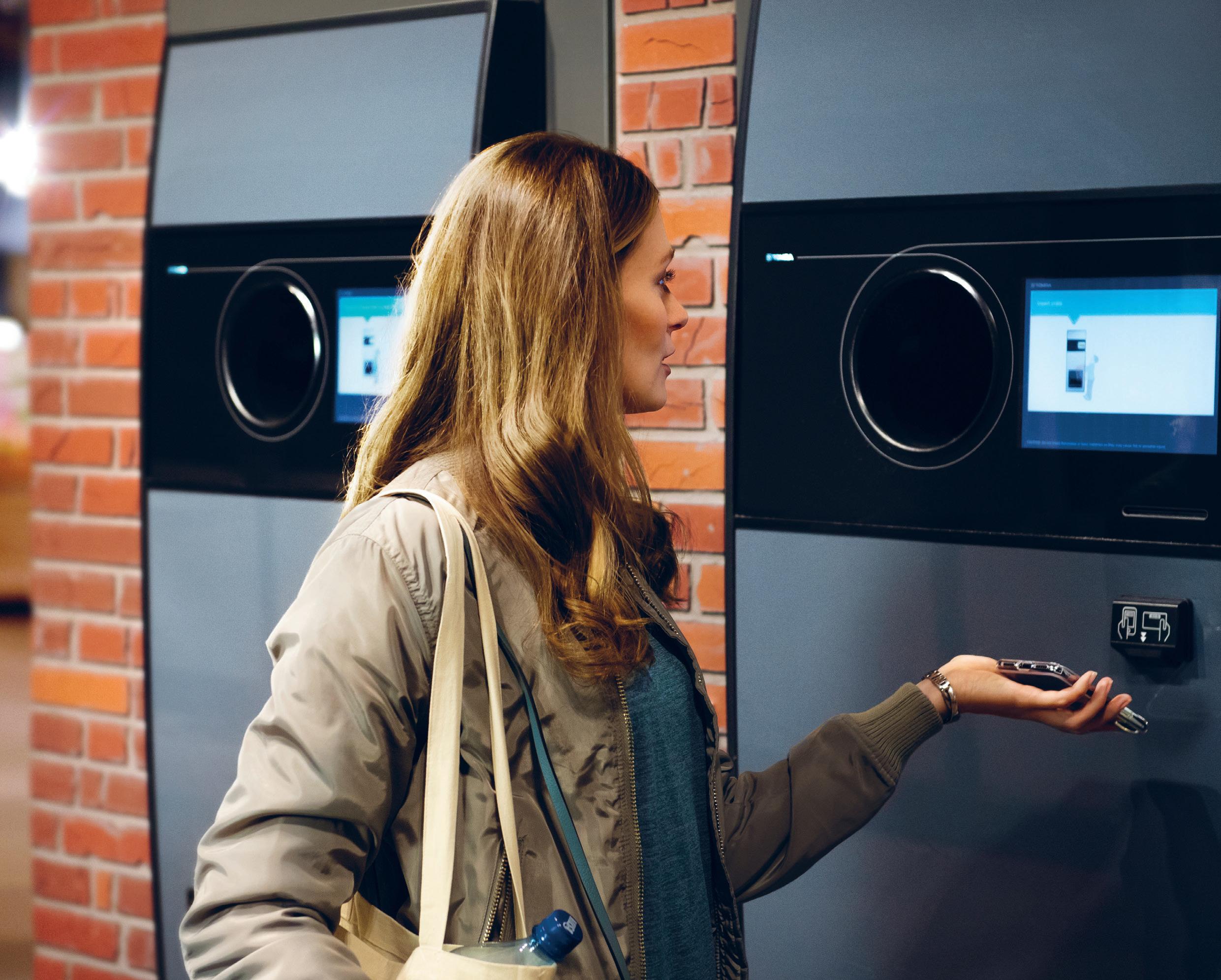
Learn more at tomra.com Scan now to get a free consultation with an expert










































































































































 BY CLAUDIA MARSHALL, MD, RVM SYSTEMS
BY CLAUDIA MARSHALL, MD, RVM SYSTEMS






























